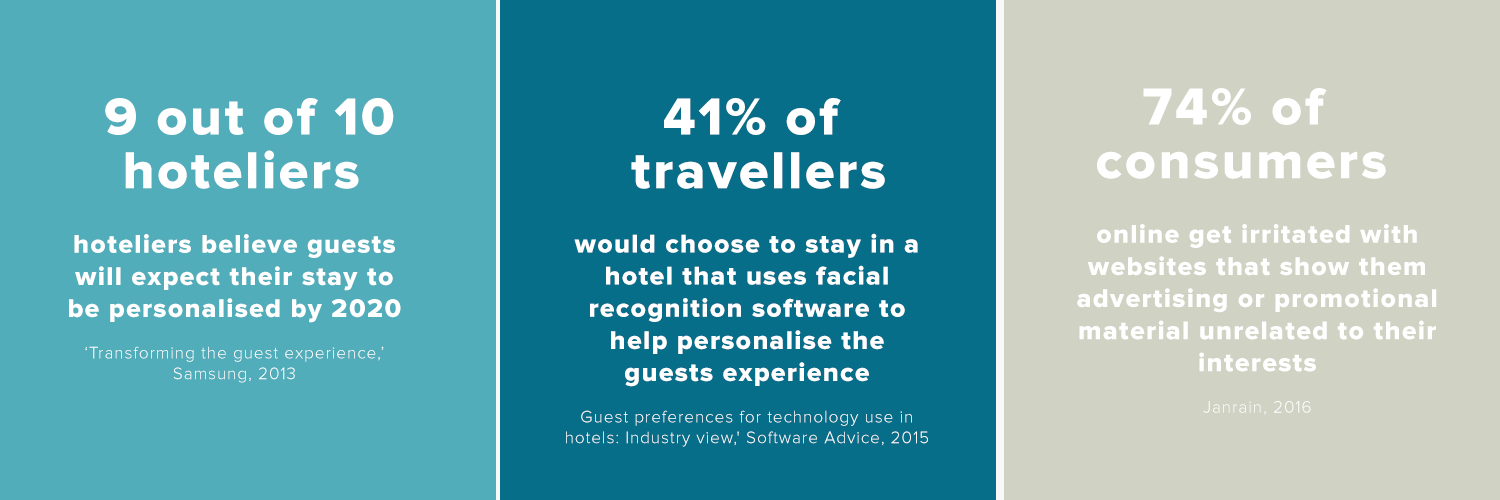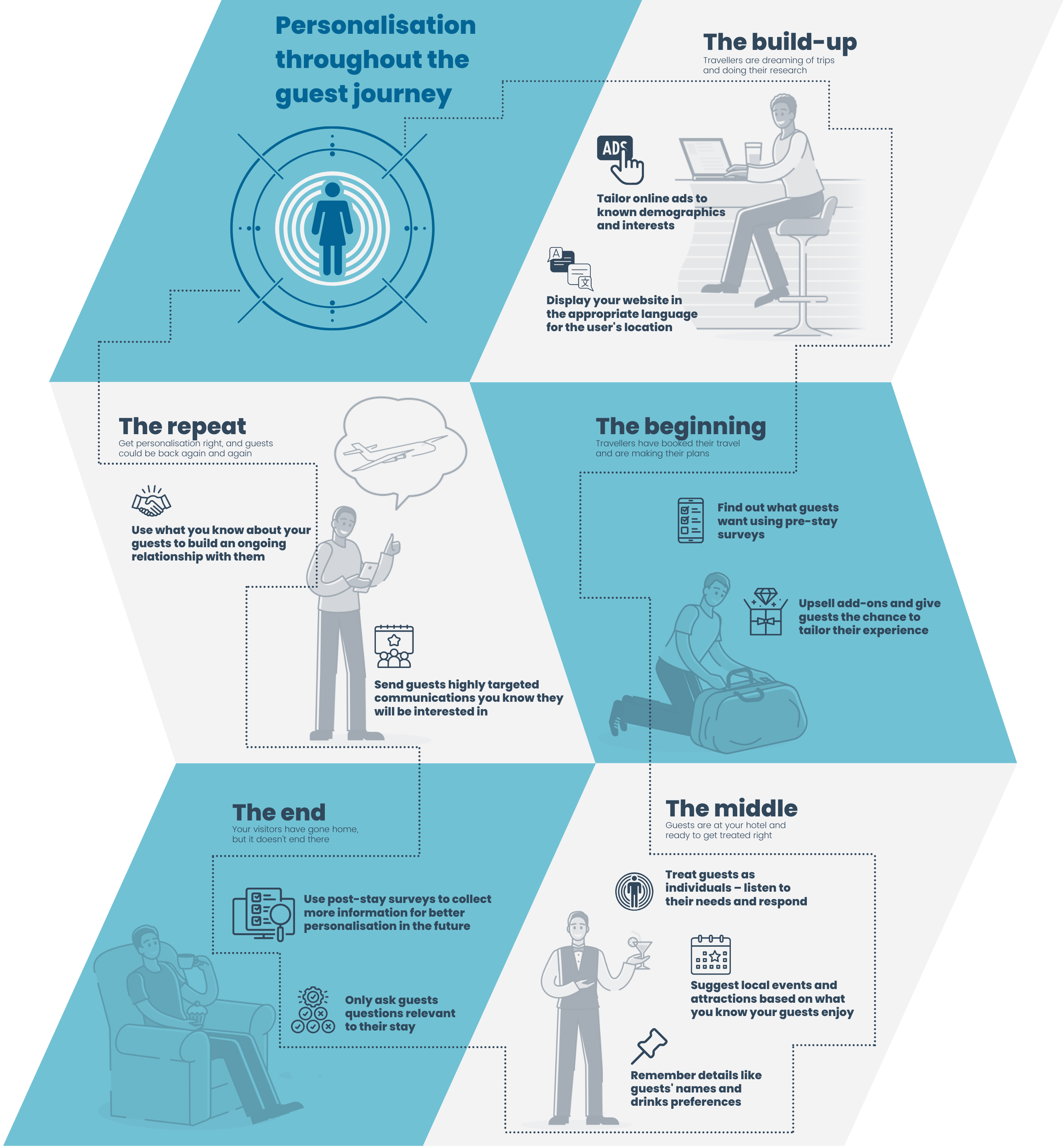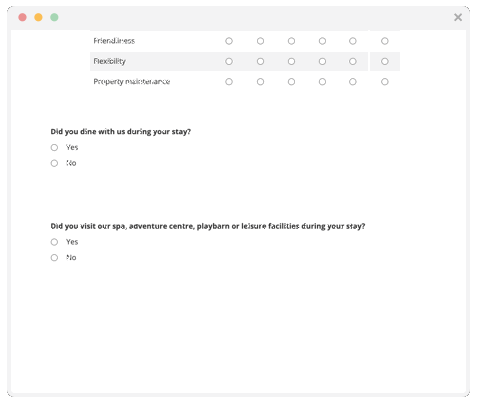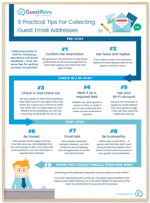
Guest Feedback
The hotelier's complete guide
No property can operate efficiently without hearing back from those whose feedback means the most — the guests. Hearing what guests have to say about their experience is vital to any hotel’s operations, since it provides insight into areas where things can be improved upon, where investment is needed, and where guest expectations are being met or exceeded.
How direct feedback and online reviews work together
When it comes to digital feedback, many immediately think of online reviews on sites such as Tripadvisor, Booking.com or Facebook, and some hoteliers still rely solely on online reviews for guest feedback. While online reviews are certainly incredibly useful all on their own, you will get a far more detailed sense of your guest experience by asking for direct feedback from your guests in the form of customised surveys with questions that solicit guest opinions on the areas that matter most to your hotel. The information collected via such surveys can also be much more easily collated and analysed.
How the Coaching Inn Group uses guest feedback
Direct feedback can bridge the gap between your perspective of your hotel and that of your guests, and it can also give you a chance to resolve situations before they become poor reviews. By providing your guests with the opportunity to address concerns with you directly, they will often feel that their feedback is being taken to heart, and feel less inclined to vent on a public platform. As they say — prevention is better than cure!
Encouraging as many guests as possible to post on review sites such as Tripadvisor can also do wonders for your online reputation. In a study done by Cornell University, it was confirmed that reviews on Tripadvisor tend to be overwhelmingly positive or negative, with very few guests providing a review for merely satisfactory experiences. Getting the guests who fall in between the extremes to review your hotel is incredibly important, not just for improving your hotel’s Tripadvisor ranking (Tripadvisor’s ranking algorithm takes recency and quantity of reviews into account as well as review ratings), but also for gaining an understanding of what an average stay at your hotel is like.
Often the difference between a perfectly pleasant stay and an utterly awful one will be the state of mind that a guest is in — based more on the guest’s attitude than their actual experience. To a guest who’s having a bad day, the smallest inconveniences or faux pas will result in the cloud over their head only darkening, and could result in a negative experience and a bad review. A guest who is in a better state of mind may experience the same inconveniences and be less affected (and not feeling compelled to write an online review). Getting feedback from both types of guest will help you know what can be done to improve the experience of future guests.
 Imagine a business traveller who has had a pleasant flight, whose bus was on time and who was greeted at the reception desk by a smiling face. This guest is shown up to his room, but unfortunately the lock on the door is finicky, and it takes quite a lot of jiggling for him to get the door open. Doors can be like that, it’s no big deal, and he settles in to prepare for his meeting the next day. Everything goes well, and he flies home – no need to leave a review.
Imagine a business traveller who has had a pleasant flight, whose bus was on time and who was greeted at the reception desk by a smiling face. This guest is shown up to his room, but unfortunately the lock on the door is finicky, and it takes quite a lot of jiggling for him to get the door open. Doors can be like that, it’s no big deal, and he settles in to prepare for his meeting the next day. Everything goes well, and he flies home – no need to leave a review.
 Now imagine a few weeks later a similar business guest comes to stay in the same room with the finicky door, but this time his plane journey was full of turbulence, the airline forgot his vegetarian meal and he missed his bus and had to wait for the next one. When he finally gets to the hotel and up to his room, exhausted, hungry and needing to prepare for his meeting, he can’t get in the door. After that nothing seems to go right – now it is time for a scathing review.
Now imagine a few weeks later a similar business guest comes to stay in the same room with the finicky door, but this time his plane journey was full of turbulence, the airline forgot his vegetarian meal and he missed his bus and had to wait for the next one. When he finally gets to the hotel and up to his room, exhausted, hungry and needing to prepare for his meeting, he can’t get in the door. After that nothing seems to go right – now it is time for a scathing review.
Finally, while online reviews can give you great insights into guest experiences, they are often only showing you the experience of the portion of your guests who are tech-savvy, have the time to post online reviews and are comfortable writing for an audience of millions. This means that if you are only using online reviews to listen to your guests, there is the risk of a large portion of them not being heard at all.
How guest feedback can help you to connect with and understand guests
“Guests experience your hotel in ways that you, as a manager, may not be able to experience it, and therefore [managers are] blindsided on certain things.”

Tarek Aboudib, General Manager, Sandy Beach Hotel and Resort
A better understanding of guest experiences
Guests are the most important part of any hotel, and while a hotelier or manager may know their property like the back of their hands — its best features, the spot with the best view, the time of day that it looks most beautiful — knowing what it is about your hotel that guests love is nearly impossible without feedback.
You can make assumptions, based on where others have spent their time, or where you feel that improvements could be made, but without feedback, investments into areas of your hotel could well be going to waste, while ignoring areas that may need addressing.
The fact that there is a gap between what management think an experience at their hotel is like, and what guests expect from the same experience, is not a revelation — in fact, there are five different gaps according to a 1985 study on the subject — but, with open communication between the two sides, these gaps can easily be bridged. The trouble is, how can this communication start? The answer is, of course, with guest feedback.
Whether it’s with comment cards, online questionnaires, or simply by asking your guests in person; if guests feel that you are making an effort to hear their opinions and see your hotel through their eyes, they will often be more than happy to provide the feedback you are after.
A better connection with guests through personalisation
More than helping you to understand what it is that guests expect when they stay with you, guest feedback can also help you to connect with your guests on another level — a personal one.
Personalisation is more than just a buzzword. Over the past few years, it has become less of a novelty offered by smaller hotels, and more of an expectation. When guests arrive at hotels, they expect to be greeted by name, and they expect their needs to be catered to beyond a room with a bed and nothing more. Whether they expect to find a home away from home or an out of this world adventure, they want an experience. The feedback that you get from guests after their stay will help you to provide just that.
Find out more about how you can use technology to personalise your guest experience
Collecting data for personalisation in the pre-stay period
Pre-stay surveys and booking information can tell you more than you would initially think about your guest and the kind of stay that they are looking for. The ideal experience that you can provide to a single guest staying for one night, who has already told you that they will be checking in late and leaving early, will be very different to the experience that you should strive to provide to a family of four who have asked for an extra bed be made up so that their son can share the room with them, which will be different yet again from the experience the couple who have booked your honeymoon suite for Valentines Day will be hoping for.
In the first instance, you can make sure that a staff member is waiting for the late check-in, greeting him by name when he arrives, since you are expecting him. You could offer an early-morning wake-up-call from reception, or ask if he would like to have room service deliver breakfast before he leaves. In the second case, you could make sure that the family of four have extra towels rather than the usual two, and that there is a copy of your children’s menu or list of activities that you provide, along with the number for a local babysitter should they want one. And for the couple, you could have the best table in the restaurant reserved and romantically lit, or have a bottle of complimentary wine waiting in their room.
Learn more about making your big data smart
Collecting data for personalisation during guests’ stays
During their stays, you have the opportunity to get to know those guests on a more personal level. For example, you may find that the single guest prefers his coffee black with a lot of sugar, that the family love swimming, and that the couple are avid adventure-seekers.
Those are pieces of information that you could never have gleaned from their booking, but it immediately lets you streamline their stay with you: you can give the single guest extra sachets of sugar and fill his cup to the brim, since he won’t need any milk; you can make sure that the swimming towels in the family’s room are replaced daily, rather than making them check towels in and out from reception; and you can tell the couple all about any local adventures that they can find nearby, like diving, bungee jumping, skydiving or just paintballing.
These small gestures won’t have you going too far out of your way, but even the smallest amounts of personalisation can see your guests enjoying their stay more, making them more inclined to think of you when it comes to booking their next trip.

Collecting personalisation data once guests have left
Finally, the feedback that guests give you after their stays can help you to personalise their next stay with you even further. Better yet, if those customers decide to stay with you again, it’s likely that they’ll end up spending more money with you than a brand new guest would.
Additionally, understanding what it was that guests loved about their trip and what could have been improved upon will help you to better understand not only those guests, but guests like them — other single guests who may be visiting on business, other families and other couples.
Personalisation exists on a scale, and doesn’t always have to be done for each individual guest. Segmenting your guest feedback data to better understand subcategories of guests and using this information to tailor the experience you provide to what these markets are looking for is a scalable and data-driven approach to personalisation that many businesses have been using for years.
Have a look at these five hotels that are getting personalisation just right

Practical ways to use guest feedback in your hotel
Without information, you’re hamstrung in terms of making intelligent decisions around your business. If you have an intelligence platform that’s telling you that 65-70% of your guests are saying that you need to spend money, you need that information so that you can make that informed decision. For example, we spent a six-figure sum refurbishing the bedrooms primarily because our guests were telling us the rooms were very dated and you can see that from their feedback.
David Campbell, Operations Director, The Coaching Inn Group
From informing operations and budget allocation, to enhancing your marketing strategy and managing your staff, there is a good deal that you can do with the feedback that you get from your guests that goes beyond the basics.
Case Study: How the Coaching Inn Group used guest feedback to facilitate nationwide expansion
Budget allocation and maintenance project prioritisation
Budgets are often tight, and investment in your hotel can only be done one step at a time. Guest feedback can tell you what the priority of those steps should be, ensuring that you are investing in projects that have the best chance of improving guest experience and attracting more guests to your hotel. It can be hard to take a step back and experience your hotel from a guest’s perspective, which means that you could be missing out on some important details of your guests’ stays.
Find out how to use your hotel's reviews to make an impact with a limited budget
A room could be perfectly spotless, fitted with the most cutting-edge technology and boasting the most stunning art, but if you are only ever walking through it for a quick check, you won’t know if the carpet is rough on bare feet, or if the water in the shower takes too long to heat, or the flushing of the loo upstairs is loud enough to wake the guest in this room in the night. Soliciting direct feedback from guests actually spending time in the hotel could indicate improvements are required that will have a far greater impact on guest experience than a drastic renovation of your foyer.
Any hotel operator needs to know what their guests are thinking about their experience; whether that’s good, bad, or indifferent. Otherwise you cannot improve your business. If you do not listen to your guests, you would go out of business very quickly because there is plenty of choice out there in the marketplace.
David Campbell, Operations Director, Coaching Inn Group
Guest feedback can help you to decide which projects should take precedence, telling you which areas guests are happy with, and which may need a bit more attention than they’re already being given. And, when it comes to groups, the feedback can help to bridge any communication gaps that might exist between each hotel’s manager, and the group managers, owners or stakeholders, making it far easier to keep track of changes that need to be made in individual hotels, or across the group, since feedback about one hotel could tell you about changes that could be made to another.
If, for example, a number of guests suggested that the decor at one hotel was outdated, affecting their impression of their room or the hotel in general; an upgrade to decor at hotels throughout the group may be in order, and may be appreciated by guests who had noticed the outdated decor, but never thought to comment on it before. It may even attract guests who had never considered your hotel before, having been attracted instead to a competitor with a more modern aesthetic.
Staff training and motivation
The people who work in the hotel interacting with the guest are creating the product, they are the people who are important, they are the ones who make it happen.
Attracting talented professionals to your hotel’s team, and keeping them satisfied and motivated is possibly the most important part of running a successful hotel, but it’s often a very tough job.
But it is a job that guest feedback can make significantly easier. Your guest feedback can be a useful tool for staff training and motivation, and can help you to foster an atmosphere of friendly competition and pride amongst staff who always want to perform at the highest levels they can.
When guests have a great customer service experience, or a not so great one, they will often remember the staff member who helped them, often for years if the memory is a particularly fond one. Asking your guests about any memorable moments that they may have had when interacting with your staff can help you to find out which team members are over- or under-performing — who is going out of their way to provide memorable customer service, and who is doing the bare minimum to get by.
.png?width=820&height=205&name=Which%20one%20of%20our%20staff%20delivered%20exemplary%20service%20(1).png)
It’s impossible for management to be everywhere at all times, so it’s not unusual for customer service to sometimes slip. But where guests are finding customer service lacking, their feedback can tell you about it, and help you to quickly address any issues with the relevant staff member or team, and get the level of service back to where it should be.
Rewarding staff for exceptional performances based on guest feedback (like the Coaching Inn Group does) will see your staff not only being motivated to provide great service, but it will also see them understanding the influence that they have over guest experiences. Even better, it will see your guests being encouraged to give you feedback — if guests know about rewards, such as employee of the month, they will often make an extra effort to provide you with details about the staff that help them during their stays as a show of appreciation.
Ensuring you’re hitting the right price point
Revenue management is a growing area of expertise in the hospitality industry, and eking a few extra pennies of profit out where practical is often the difference between a hospitality business succeeding or having to close its doors for good.
Understanding what your guests are willing to pay for, and what makes an experience worth a bit extra is a great way to ensure you're not leaving money on the table. It’s important to keep a close eye on your value for money score (and how it compares to your competitions), and on guest ratings on revenue generating sectors of the hotel (like the spa, curio shop, or bar).
Find out how guest feedback can inform your hotel’s revenue management strategy
Marketing your hotel with a story that resonates with guests
Last, but certainly not least, guest feedback can go a long way to enhancing your marketing strategy. Knowing what it is that guests love about your hotel can help you to focus your marketing on those areas to attract others who will appreciate the same things. If, for example, your guest feedback is telling you that your views are spectacular, and that guests appreciate how peaceful their stay with you was, you will market your hotel very differently than you would if your guest feedback was telling you that the night-life nearby was what drew them to you, or that your restaurant was the highlight of their stay. In one case, you could focus on marketing a peaceful getaway with spectacular views; in the other, you could focus on the entertainment around you, and the excellent dining that you offer.
Learn how to use online information to define your competitive edge
Whichever area you choose to focus your marketing on, you will have the opportunity to attract guests who are looking for exactly what you offer – and what your competition does not. This is what makes guest feedback so essential. If you offer a spa, but guests are telling you that their experience there is underwhelming, focussing your marketing efforts on your spa will only lead to disappointment. Marketing the right aspect of your hotel will reach the kind of people who will appreciate what you have to offer, and see a far better return on investment for your hotel.
Using guest feedback can also help you to remarket your hotel to those who have stayed with you before. A guest who has thoroughly enjoyed their experience with you could become a repeat customer with the right marketing strategy, and their feedback can help you to not only personalise their stays, but the marketing that they get as well. A single guest who stayed on a business trip may have little or no interest in the special romantic weekend package you have on offer, but for a couple it may be perfectly timed. And even where a guest had a negative experience, using your marketing to show them the improvements that have been made based on their feedback may see them deciding to give your hotel another try.
How to get useful guest feedback
Your guests' time is precious, and while you should absolutely be asking them for feedback, you should also make sure that you’re getting feedback you can actually use. You could get responses from hundreds of guests, but if all of those guests are simply telling you that their stay was okay, without going into any detail, it will be hard to pinpoint how you could improve and turn an “okay” stay into an excellent one. This is where having a feedback partner can come in particularly handy, and where technology can give you a helping hand.
Find out more about how guest engagement and technology come together
In the past, guest feedback has taken place via the ‘pen and paper’ approach of comment cards and feedback forms left in guest rooms or at reception desks. But technologies have evolved, removing the need for guests to fill these out by hand and simplifying the process for hospitality professionals who previously needed to capture this information.
We know by now that comment cards have some drawbacks:
- They may get lost or be illegible
- Some guests may not want the confrontation of handing in a comment card or talking to staff directly
- Disgruntled staff may purposefully dispose of certain comment cards before they reach management
- Comment cards are time consuming for guests to fill in during their stays
Online questionnaires, however, provide a perfect opportunity to find out from guests exactly what their stay was like and where their expectations for the trip weren’t quite met.
It’s not just important to hotels — other businesses in hospitality can benefit too
What’s particularly great about automated direct feedback, especially for someone like a general manager when compared to the comment card system, or even online reviews, is the amount and detail of data you can get, and how you can view, segment, visualise and use it.
For a start, there is no space limit. Guests can tell you as much as they want about what they like and don’t, what they need and want, and who they are — you can even ask guests who gave you a low score in one area additional drill down questions, while keeping the survey shorter for the guests who had a good time.

With automated online surveys sent after checkout via email, you can ensure you’re requesting feedback from guests without any extra workload for your team, and guests can complete these surveys at a time that's convenient for them, rather than while they are focussing on having a good holiday, or trying to check out in time to catch their flight. And, importantly, as these surveys are being filled in away from your hotel and staff, guests tend to be more honest.
Before you can send out any surveys to your hotel guests, you need to know where to send them. Every time a guest books with you, checks in or emails you, you have an opportunity to capture their email address. Making sure that you have the correct email addresses for your guests will mean that you can send them online questionnaires.
Every incorrectly captured address is an opportunity lost — if you can’t get hold of them, how will they give you the detailed feedback that you’re looking for? Few guests are going to email the hotel that they stay at to tell them about their experience if they aren’t prompted — they’re far more likely to simply go onto their favourite review site and post a review there. And while online reviews can be a lot of help, the details in them usually only get you so far. So capture correct email addresses right at the start and make sure that you are contacting your guests and asking them for feedback — they’ll often be more than happy to oblige, especially if you tell them upfront what it is that you want to use their address for.
There are ways to encourage your guests to give you feedback, from having in-house feedback methods like QR codes that link to your online guest survey, to reminding them about the email that you will send them when they check out of your hotel. But it’s not uncommon for emails to go unnoticed, unopened, or unclicked. A great subject line can go a long way to convincing guests to open your email, while an obscure one could see them not knowing that the email has come from you, or have them suspecting that it’s spam.
The message that your email contains could also see its readers either clicking through straight away to give you the feedback that you need, or it could see them glancing over it and carrying on with their day without taking any action. Making sure that your message is personalised, and that it thanks them for their time with you and stresses how valuable you would find their insight is more likely to see a response than a one-lined link to your questionnaire, and nothing more.
Find out the secret to an engaging questionnaire
Once you have all of the email addresses at hand and your emails written up, it’s time to send out your questionnaires. If you have a property management system, this can even happen automatically, without you needing to lift a finger. Your guests’ details would already be stored, and your questionnaire could simply be sent immediately on check-out, or a day or two later, according to your preference. Often it’s best to give your guests time to get back home and start to reminisce fondly of their trip before asking for feedback — if you ask immediately, your email may get buried and not be at the top of their inbox by the time they arrive home. Even if you don’t have a property management system, sending out emails is simple, as long as you’ve got the right contact details for your guests.
Is there anything different you should be asking your guests after the pandemic?
And then it comes down to the questionnaire itself. Making sure that the guest survey is engaging and that you are asking the right questions to get feedback from your guests is absolutely vital — without the right questions, you’re unlikely to get the kind of feedback that you can use for informing operational decisions, managing staff or marketing your hotel. Don’t forget to ask about the kind of stay that the guest was on — business, family, romantic, etc — and find out a little bit more about the guests themselves. These are the kinds of questions that will help you with your marketing further down the line. When you get to the questions about your hotel, don’t ask your guests too many questions or they will be unlikely to finish the survey. If you have a feedback solution that uses smart logic like GuestRevu, this will not be a problem, as only guests who give low scores are asked additional questions about what went wrong.

